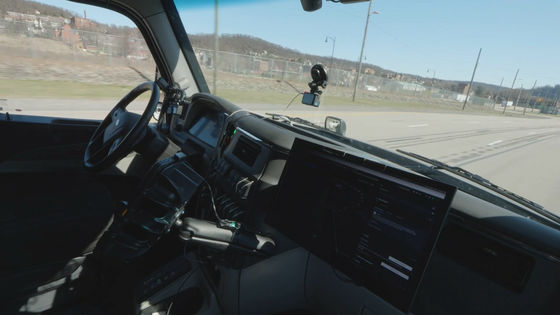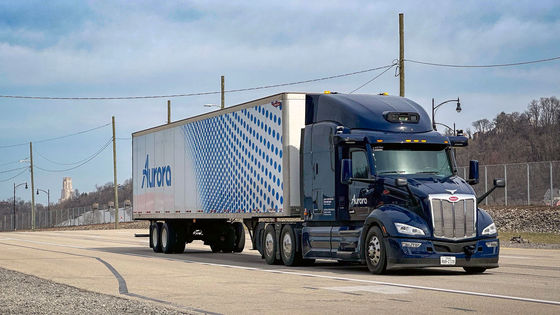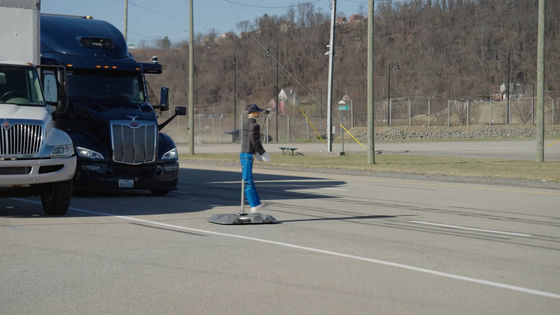``Self-driving trucks'' that will revolutionize the transportation industry will soon start running on highways in the United States

The Washington Post points out that self-driving trucks may soon bring about a revolution in the transportation industry that transports goods manufactured in factories to retail stores.
Autonomous semi trucks are coming, despite job fears and lack of regulation - The Washington Post

Prioritizing Safety: A Spotlight on Driverless Trucking Capabilities
https://blog.aurora.tech/safety/driverless-trucking-capabilities
A truck weighing 35,000 pounds (about 15.9 tons) running south on Interstate 45 in Palmer, Texas, USA. AJ Jenkins, a driver on a huge truck with 18 wheels, is sitting in the driver's seat of the truck, but he is not actually driving the truck.
The truck that Mr. Jenkins is riding is running automatically, and if it finds an emergency vehicle while driving on a worn-out road surface, it can move to the shoulder of the road so that it does not interfere with the truck. After exiting the highway, the self-driving truck that Jenkins was riding in suddenly stopped after turning sharply at an intersection. The reason seems to be that there were people near the truck. Jenkins, a former FedEx delivery worker, said, ``There were people acting strangely around the truck. You need to be prepared for anything,'' and praised the automatic driving system's judgment. .
The self-driving truck that Mr. Jenkins is riding is a vehicle developed by Aurora and planned to be sold jointly with Kodiak Robotics . Both companies aim to launch self-driving trucks by the end of 2024

The advent of such self-driving trucks could have a significant impact on the American supply chain. It is attracting attention from the industry as a technology that can dramatically reduce the cost of transporting goods and eliminate human labor costs and physical constraints in the trucking industry. However, it is also true that there are multiple issues that need to be addressed when autonomous trucks travel on highways, including safety, job losses, and lack of regulation.
At the time of article creation, unmanned autonomous vehicles are allowed to run in the United States unless explicitly prohibited by the state. In other words, companies will be able to operate unmanned self-driving cars in most parts of the country. According to Aurora, unmanned autonomous driving is permitted in 24 states, including Texas, Florida, Arizona, and Nevada, and there are no regulations regarding autonomous vehicles in 16 states. Only the remaining 10 states, including California, Massachusetts, and New York, have clear restrictions on the use of self-driving cars within their state borders.
Some labor safety advocacy groups are concerned about the delay in regulating self-driving trucks in the United States, and are calling on several states to enact state laws that completely ban the operation of self-driving trucks. and conducts lobbying activities. However, at the time of writing this article, these efforts have not borne fruit.
The California Legislature has approved a bill that would require all self-driving trucks to have a human driver in 2023, but California Governor Gavin Newsom has already announced that the state has one. Since there are regulations prohibiting the passage of self-driving cars weighing more than 10,000 pounds (approximately 4,500 kg), he refused to sign the bill, saying ``There is no need to establish new regulations like this.''

Transportation industry experts have said that delays in regulating self-driving trucks could cause disruption to the U.S. economy, and some have complained about the slow pace of the government's efforts. 'The advent of self-driving trucks could transform economic geography in the same way that railroads and shipping did,' said Steve Viscelli, a sociologist at the University of Pennsylvania who studies the trucking industry. I did. Also, it seems that truck drivers have expressed strong concerns about self-driving trucks.
There's also the issue of self-driving cars causing major disruption in urban areas like San Francisco. In 2023, an accident occurred in which a self-driving taxi hit a pedestrian walking on a pedestrian bridge, leading to concerns from critics that ``self-driving trucks could cause even more tragic accidents.'' Masu.
An accident occurs in which a fully autonomous robotaxi further hits a hit-and-run pedestrian - GIGAZINE

Aurora is an autonomous driving technology development company founded in 2017 by former executives from Uber, Google, Tesla, etc., and has been conducting test runs of unmanned autonomous trucks in Texas, USA since 2020. At the time of writing the article, it seems that they are already transporting more than 100 packages per week such as FedEx.
Aurora plans to have about 20 fully autonomous trucks traveling the 240 miles between Dallas and Houston by the end of 2024. I am planning to operate a driving truck.
Kodiak Robotics, which has a partnership with Aurora, is also a self-driving technology development company founded by former Uber and Alphabet employees. The company also plans to start operating self-driving trucks in Texas by the end of 2024, and Daimler Trucks also plans to start operating self-driving trucks in the United States by 2027.
Nat Bews, Aurora's chief safety officer, said of self-driving trucks, 'The technology of self-driving trucks will 'We have systematically introduced this,' he said.

Mark Williams, executive director of the Texas Department of Transportation, emphasized the state's strong relationships with self-driving car developers testing on Texas roads and the state's support for the self-driving industry. We emphasized that we are at the forefront of doing so. Williams also argues that self-driving technology is an essential element for Texas' economic growth.
Texas isn't the only state where Aurora's self-driving trucks are being tested. It is said that test drives of self-driving trucks are also being conducted in states such as Oklahoma and New Mexico. According to data published by the National Highway Traffic Safety Administration (NHTSA), self-driving trucks operated by three major companies in the self-driving truck industry have been involved in several traffic accidents since 2021. There have been no accidents resulting in death or serious injury.
The most significant accident caused by a self-driving truck was a rollover accident in July 2022 involving a self-driving truck from Daimler Trucks on a highway in New Mexico (oil in the fuel tank spilled onto the highway). The two accidents were the one in December 2023 when a self-driving Daimler Trucks truck collided with a deer on a road in Texas.
One of the accidents involving Aurora's self-driving truck is ``an accident in which another truck trying to overtake Aurora's self-driving truck caused a hydroplaning phenomenon and collided with Aurora's self-driving truck.'' In addition, at the time of this accident, although the self-driving truck detected that the truck it was trying to overtake was approaching, it seems that it was unable to avoid the accident.
Detecting and avoiding collision wrong-way driver - YouTube
Although multiple accidents caused by self-driving trucks have been reported, some say that ``If self-driving trucks appear, highways will become safer.'' In the United States, 5,788 people died in collisions with large trucks in 2021, which is equivalent to 13% of the total number of deaths caused by traffic accidents in 2021.
NHTSA and the Federal Motor Carrier Safety Administration (FMCSA) are leading the regulations regarding self-driving trucks. The two agencies have been working for more than five years to develop basic regulations for self-driving trucks, including requirements for vehicle maintenance, inspection, and assistants to monitor driving. Although this proposed regulation was submitted to the White House's Office of Management and Budget in December 2023, it is unknown at the time of writing this article when this proposed regulation will come into effect. Therefore, The Washington Post points out that ``technology develops faster than regulations.''
In response to this report, a comment on social media said, ``We understand that there are many skeptical opinions about self-driving trucks, but such people are wondering how much economic incentive they will receive if self-driving trucks become a reality.'' I think we're underestimating how likely it will be.The transportation industry, the insurance industry, and truck manufacturers are all eager for self-driving trucks to become a reality. We're approaching a concrete stage where we can ask , ``Is this the case?''
Related Posts:






